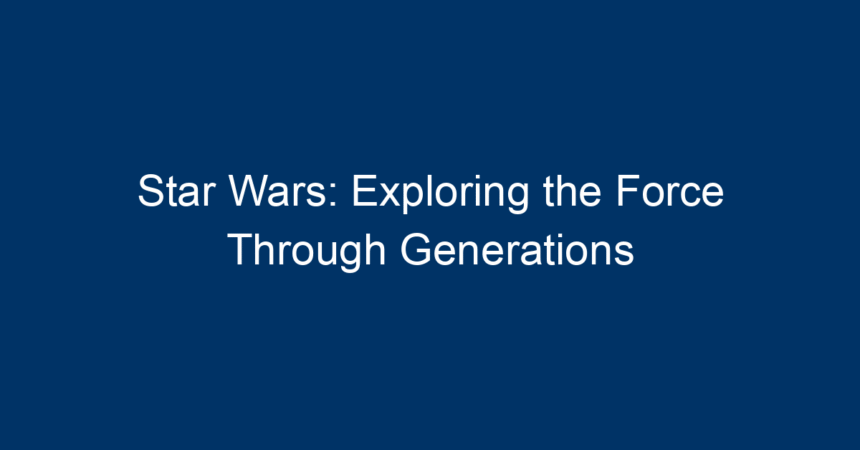The Star Wars franchise has captivated audiences since the release of its first film in 1977. With a rich tapestry of lore, characters, and a universe teeming with adventure, what truly sets Star Wars apart is its philosophical underpinnings, especially the concept of the Force. This mystical energy binds all living things and has a profound impact on the story arcs across generations. In this article, we will delve deep into the Force, exploring its evolution and significance within the saga, its impact on characters, and how it continues to resonate with audiences today.
The Origins of the Force in Star Wars
The Force Defined
In Star Wars, the Force is described as an energy field created by all living things. It is described in the iconic words of Obi-Wan Kenobi as that which "surrounds us and penetrates us," connecting all life in the galaxy. The duality of the Force, split between the Light and Dark sides, presents moral complexities and choices that drive the narrative.
Early Concepts
George Lucas, the creator of Star Wars, was influenced by various philosophies and religions when conceptualizing the Force. Elements from Buddhism, Taoism, and even Western mysticism can be seen in how the Force operates. Initially portrayed as a simple, mystical power, the Force evolved to represent deeper themes like balance, choice, and identity.
The Force Through Generations
The Original Trilogy: An Awakening
Coming back to the 1970s, the original trilogy introduces audiences to the Force through the journeys of characters like Luke Skywalker, Princess Leia, and Darth Vader. As viewers navigate the epic battles between the Rebel Alliance and the Galactic Empire, they also witness Luke’s growth from a farm boy to a Jedi Knight. This transformation is epitomized by his training with Yoda, who embodies wisdom and caution.
Key Character Arcs
-
Luke Skywalker: Luke’s journey symbolizes hope and redemption, with the Force guiding him toward his destiny. His struggle with the Dark Side, especially during his encounters with Vader, showcases the internal battles faced by many characters across the franchise.
-
Darth Vader: Once Anakin Skywalker, Vader’s fall into darkness illustrates the perils of fear and seduction of power. His eventual redemption through Luke demonstrates the enduring nature of familial bonds, even amidst strife.
- Yoda: Serving as the ultimate mentor, Yoda’s insight into the Force provides philosophical depth. His sayings, like "Do or do not, there is no try," have become part of popular culture, emphasizing determination over hesitation.
The Prequel Trilogy: The Rise of the Sith
While the original trilogy focused on hope and redemption, the prequel trilogy delves into the origins of Anakin Skywalker and the corruption of the Jedi Order.
The Complexity of the Force
-
Anakin Skywalker: Anakin embodies the tragic hero whose fear of loss and desire for power lead him to the Dark Side. The Force is shown as something that can be manipulated, raising questions about control and fate.
-
The Jedi Order: As the prequels unfold, the rigidity of the Jedi Order highlights a fundamental flaw—their inability to adapt and understand the emotional complexities of the galaxy. The teachings about the Force become increasingly scrutinized, revealing the dichotomy between emotion and discipline.
- The Sith’s Philosophy: The Sith, fueled by passion and ambition, present a stark contrast to the Jedi’s restraint. This duality illustrates the seductive nature of power, challenging the audience’s understanding of good and evil.
The Sequel Trilogy: Legacy and New Beginnings
As Star Wars transitioned into a new era with the sequel trilogy, the concept of the Force continued to evolve, reflecting the ongoing journey of its inheritors.
New Characters, Old Lessons
-
Rey: The protagonist of the sequels, Rey embodies the search for identity and belonging. Her journey mirrors Luke’s, as she learns to harness the Force while grappling with her mysterious lineage.
-
Kylo Ren: The conflicted Ben Solo represents the struggle between light and darkness. His internal conflicts showcase the complexities of inheriting a legacy and the burden of expectations.
- Leia Organa: As a strong leader and mother, Leia’s connection to the Force adds depth to her character, demonstrating that the Force transcends gender. Her legacy impacts future generations, solidifying the notion that learning and growth are ongoing.
The Force in Expanded Universe Media
Beyond the films, the Star Wars universe stretches into novels, animated series, and comics, further exploring the philosophies of the Force.
Key Contributions
-
The Clone Wars: This animated series dives deeper into the Force, presenting the Jedi’s involvement in the Clone Wars and exploring the moral ambiguities of war. Characters like Ahsoka Tano provide new perspectives on the Jedi’s code.
-
Star Wars Rebels: This series emphasizes the importance of hope and community in the fight against tyranny, reinforcing the idea that the Force can manifest in various ways.
- Novels and Comics: The expanded universe introduces countless characters who experience the Force differently, reflecting diverse philosophies and interpretations.
Relevance Today: The Force’s Lasting Impact
As the Star Wars franchise continues to expand, the themes of the Force remain central, resonating with fans across generations.
Modern Interpretations
The Force today can be seen as a metaphor for the human experience, representing our struggles, desires, and the choices we make. As society grapples with issues of identity and morality, the Force serves as a timeless reminder of the balance between light and dark.
Community Engagement
The Star Wars fandom thrives on discussions about the Force, with fan theories and debates enriching the community’s experience. Events such as Star Wars Celebration bring fans together, rejuvenating the spirit of unity and shared passion.
Conclusion: Embracing the Force
In conclusion, the Force in Star Wars serves as a profound symbol of connection, morality, and personal growth that spans generations. From the original trilogy’s themes of hope and redemption to the modern narrative’s focus on identity, the Force remains a timeless subject for exploration.
Actionable Insights
- Explore Different Perspectives: Delve into the expanded universe of Star Wars to gain a richer understanding of the Force through different characters and narratives.
- Engage with the Community: Join discussions and explore fan theories. Participating in forums and attending events will deepen your appreciation for the franchise.
- Reflect on Personal Experiences: Consider how the themes surrounding the Force resonate with your life—what choices echo the struggle between light and dark within you?
As we continue to explore the galaxy far, far away, the Force remains a guiding light, reminding us of the power we hold within ourselves and in our connections with others. May the Force be with you!




